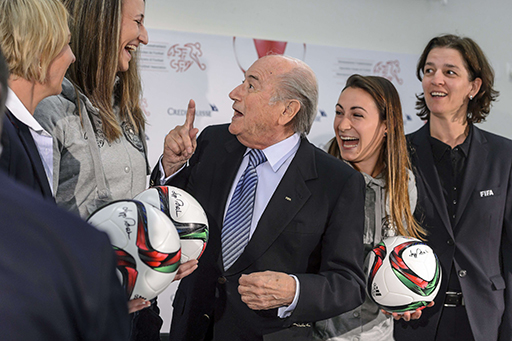2 Sepp Blatter: sexist leader or godfather of the women’s game?

It might be an understatement to suggest that former FIFA President, Sepp Blatter, is one of the more controversial figures in world football. Indeed, in the wake of the 2015 corruption scandal Blatter’s reputation was severely damaged, arguably beyond repair. His history of blunders has been well documented, including the time he offered fashion advice by suggesting that women players wear tighter shorts for ‘a more female aesthetic’ (Christenson and Kelso, 2004).
Yet among all the controversy remains a figure who some claim shepherded the women’s game into a position it might have never reached without him (Macur, 2015). Blatter, never one to hide his ego, once described himself as the ‘godfather’ to women’s football (Wire, 2015).
Activity 2 Blatter’s influence on women’s football
Watch the below video clip recorded by the Oxford Union in 2013 where Blatter gives his views on women’s football, and then read the New York Times article by Macur (2015). Respond to the following questions:
- Are you convinced by the claims in either source of Blatter’s influence in the development of women’s football?
- What other factors might have been attributed to the growth in women’s football, particularly throughout the 2010s?

Transcript: Video 1 Sepp Blatter on women’s football
To access a free version of ‘A little praise for Sepp Blatter. Very little’ by Juliet Macur, follow these steps:
- Open a search engine, e.g., Google.
- Type in ‘a little praise for Sepp Blatter’
- Select the top result from the New York Times website
Discussion
- This is an interesting debate given the reputation of Blatter as ‘unapologetically sexist’ (Venetis, 2015). Nevertheless, it’s difficult to argue that under Blatter’s presidency an expansion of women’s football around the globe took place. Whether he spearheaded this or, as USA star Megan Rapinoe put it, simply allowed it to grow remains up for discussion.
- The expansion of teams competing in the 2015 World Cup (from 16 in 2011 to 24 in 2015) ensured wider coverage throughout the world. Meanwhile, there has been a growth in professional women’s football as a result of greater investment. Most top domestic teams across the world are now fully professional and many countries have professional women’s leagues. Growing participation internationally has translated to an improved quality of football and therefore better competitive balance (Scelles, 2021) boosting fandom and reputation. The 2019 World Cup in France generated a record-breaking number of viewers, with 1.12 billion people watching the final between the United States and Japan (FIFA, 2019).
It may be generous to suggest that Sepp Blatter is a football hero of any kind. Afterall, the same year he proclaimed to be the godfather of women’s football, he failed to travel to Canada for the women’s World Cup (Dunn, 2016).
